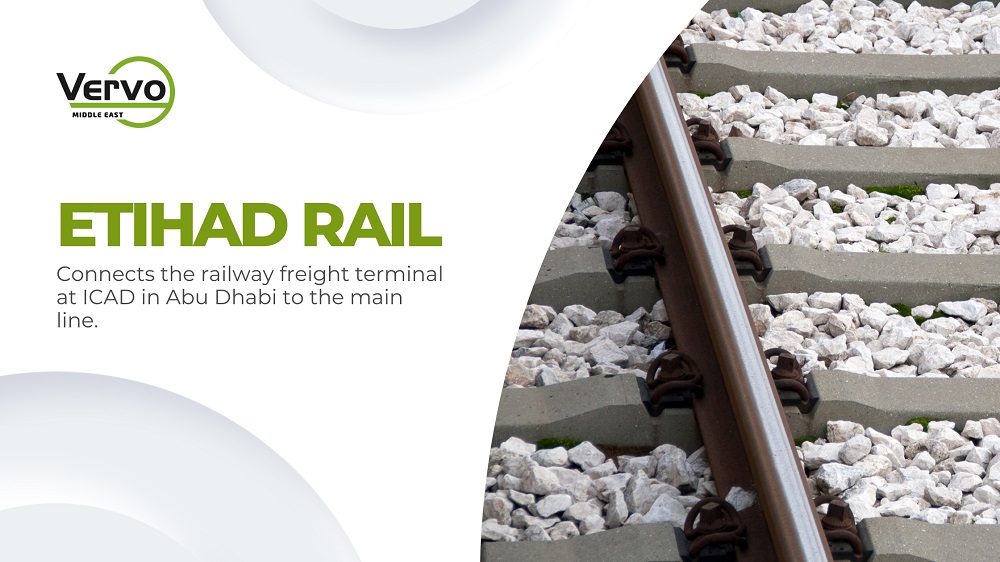Etihad Rail recently declared completing the link between the Industrial City of Abu Dhabi (ICAD), the country's largest inland freight railway terminal, and the UAE National Rail Network.
The company finished tracklaying construction and successfully tested the new line, which runs from Saudi Arabia's borders to the port of Fujairah on the eastern coast, passing through industrial areas and urban districts.
Etihad Rail developed the line as part of the UAE National Network's Stage 2 construction. Phase 1 is 264 kilometers long and transports grainy sulfur from Shah and Habshan to the port of Ruwais. Phase 2 should connect the UAE and Saudi Arabia, stretching 1200 kilometers from Fujairah Port to Ghuweifat (the UAE's border with Saudi Arabia). This phase connects the Emirates via Abu Dhabi, KIZAD (Khalifa Industrial Zone Abu Dhabi), Khalifa Port, Jebel Ali Port, Dubai, Sharjah, Ras al-Khaimah, and then to Fujairah on the east coast.
This accomplishment aligns with the aims of the UAE National Railway Project, which is the country's integrated system for carrying cargo and passengers. The initiative intends to:
- Connect the country's important industrial and manufacturing centers;
- Link the Gulf Cooperation Council (GCC) countries;
- Develop new trade routes;
- Simplify people's movement.
The First Stage of Etihad Rail
Construction on the UAE network is 70% complete. It has been fully operational since January 2016 and transports up to 22,000 tons of sulfur pellets daily from Habshan and Shah to Al-Ruwais Port. Since 2016, Etihad Rail has already provided transportation for more than 30 million tons of sulfur pellets. The first phase offers modern, safe, cost-effective, and environmentally friendly services, which will be enhanced and developed as the project moves into phase two.
The Second Stage of Etihad Rail
Stage Two will extend across the United Arab Emirates. By the end of that stage, the network will be the first transport system connecting the most important cities in the UAE, from Ghuwaifat to Fujairah. Etihad Rail will then provide logistical solutions from the railway station, positioned in the heart of Abu Dhabi's Industrial City, a growing center of industrial businesses in the region.
Phase two: Connecting ICAD to the main line:
The construction of the ICAD railway freight terminal is part of the UAE's national railway network's Stage Two. "As the biggest interior railway cargo terminal in the UAE, the strategic position of the ICAD railway freight terminal will also generate value for all of our users," said Mohammed Al Marzouqi, Executive Director, Rail Relations Sector, Etihad Rail.
Etihad Rail is creating the biggest inland railway freight terminal in the UAE at ICAD, which will span approximately 2.7 million square feet and include more than 22 buildings and infrastructure to support operations, handling up to 9 trains daily.
It would allow cargo movement between Gulf Cooperation Council (GCC) and UAE countries, linking quarries in the northern emirates to industrial cities in the Musaffah area and connecting Ruwais, Khalifa Port, and Dubai's container firms inside Jebel Ali Port. Following a road tour to the end-user destination, the rail will transport containers to and from other freight sites.
When fully operational, the new terminal at ICAD will process more than 15 million tonnes of bulk raw materials, 1.5 million tonnes of general freight, and around 116,600 20ft containers each year.
This new railway freight terminal will also serve as a logistical center for heavy industries, allowing for the smooth transportation of raw materials and machinery to factories and improved linkages to critical trade infrastructure such as seaports and airports. It will also provide customs services.

